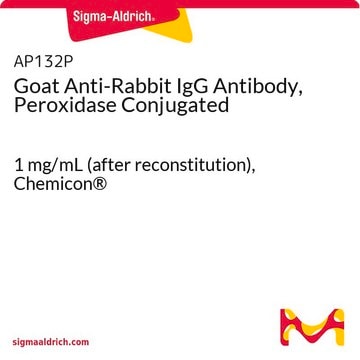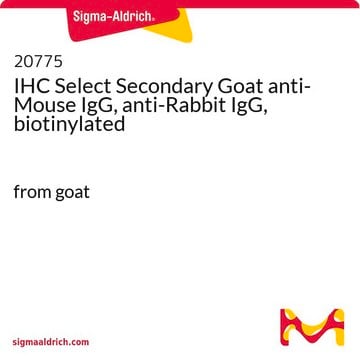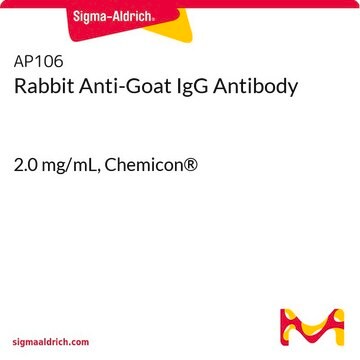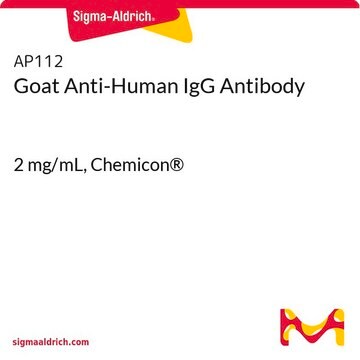AP132-M
Goat Anti-Rabbit IgG Antibody
2 mg/mL, Chemicon®
Sign Into View Organizational & Contract Pricing
All Photos(1)
About This Item
UNSPSC Code:
12352203
eCl@ss:
32160702
Recommended Products
biological source
goat
Quality Level
conjugate
unconjugated
antibody form
affinity purified immunoglobulin
clone
polyclonal
species reactivity
rabbit
manufacturer/tradename
Chemicon®
concentration
2 mg/mL
technique(s)
ELISA: suitable
immunofluorescence: suitable
western blot: suitable
shipped in
wet ice
General description
Immunoglobulin G (IgG), is one of the most abundant proteins in human serum with normal levels between 8-17 mg/mL in adult blood. IgG is important for our defence against microorganisms and the molecules are produced by B lymphocytes as a part of our adaptive immune response. The IgG molecule has two separate functions; to bind to the pathogen that elicited the response and to recruit other cells and molecules to destroy the antigen. The variability of the IgG pool is generated by somatic recombination and the number of specificities in an individual at a given time point is estimated to be 1011 variants.
Specificity
Reacts with Rabbit IgG gamma chain, as well as the light chains from all Rabbit immunoglobulin classes. Monospecific on IEP against whole Rabbit Serum.
Immunogen
Highly purified Rabbit IgG isolated from pooled normal Rabbit Serum.
Application
Goat anti-Rabbit IgG Antibody is an antibody against Rabbit IgG for use in ELISA, IP & WB.
Research Category
Secondary & Control Antibodies
Secondary & Control Antibodies
Research Sub Category
Whole Immunoglobulin Secondary Antibodies
Whole Immunoglobulin Secondary Antibodies
Storage and Stability
Store at +2-8°C.
Legal Information
CHEMICON is a registered trademark of Merck KGaA, Darmstadt, Germany
Disclaimer
Unless otherwise stated in our catalog or other company documentation accompanying the product(s), our products are intended for research use only and are not to be used for any other purpose, which includes but is not limited to, unauthorized commercial uses, in vitro diagnostic uses, ex vivo or in vivo therapeutic uses or any type of consumption or application to humans or animals.
Certificates of Analysis (COA)
Search for Certificates of Analysis (COA) by entering the products Lot/Batch Number. Lot and Batch Numbers can be found on a product’s label following the words ‘Lot’ or ‘Batch’.
Already Own This Product?
Find documentation for the products that you have recently purchased in the Document Library.
Customers Also Viewed
The promotion of human mesenchymal stem cell proliferation by superparamagnetic iron oxide nanoparticles.
Dong-Ming Huang,Jong-Kai Hsiao,Ying-Chun Chen,Li-Ying Chien,Ming Yao,Yin-Kai Chen et al.
Biomaterials null
Effect of body condition score of the dairy cow on the in vitro immune response of peripheral blood mononuclear cells to progesterone stimulation.
Ohtsuka H, Murase Y, Ando T, Kohiruimaki M, Mukai M, Oikawa M, Petrovski KR, Morris S
The Journal of Veterinary Medical Science null
Iron oxide nanoparticle-induced epidermal growth factor receptor expression in human stem cells for tumor therapy.
Tsai-Hua Chung,Jong-Kai Hsiao,Szu-Chun Hsu,Ming Yao,Yao-Chang Chen,Shih-Wei Wang et al.
ACS Nano null
J V Joseph et al.
Cell death & disease, 5, e1443-e1443 (2014-10-03)
Different molecular subtypes of glioblastoma (GBM) have been recently identified, of which the mesenchymal subtype is associated with worst prognoses. Here, we report that transforming growth factor-β (TGF-β) is able to induce a mesenchymal phenotype in GBM that involves activation
Mihai G Mehedint et al.
FASEB journal : official publication of the Federation of American Societies for Experimental Biology, 24(1), 184-195 (2009-09-16)
Maternal choline availability is essential for fetal neurogenesis. Choline deprivation (CD) causes hypomethylation of specific CpG islands in genes controlling cell cycling in fetal hippocampus. We now report that, in C57BL/6 mice, CD during gestational days 12-17 also altered methylation
Our team of scientists has experience in all areas of research including Life Science, Material Science, Chemical Synthesis, Chromatography, Analytical and many others.
Contact Technical Service













